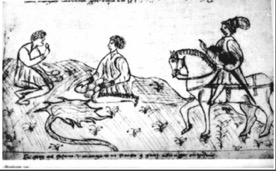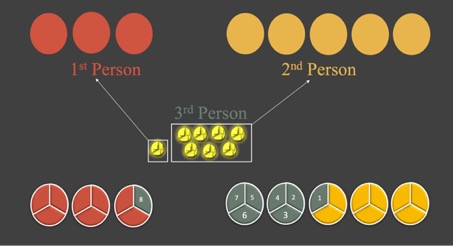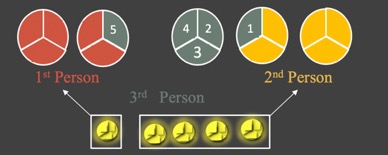
Sharing Bread
|
This puzzle seems to have been first asked of Ali-Ibn-Abi Talib, the 4th caliph of early Islam (600-661 AD). It has been taken from Abeer Alsaedi‘s Math 562 project done at NMSU, which was completed in 2017. There were two men having a meal. The first man brought 5 loaves of bread, and the second brought 3. A third man, Ali, came and joined them. Together they ate the whole 8 loaves. And as Ali left, he gave the men 8 coins as a thank you. The problem was how to divide the money between the two men who provided the bread. The man who brought five loaves said he would take five of the coins and give his partner three. But the second man, who brought three loaves, refused and asked for half of the sum (i.e., 4 coins), as an equal division. But the first man refused. They went to Ali-Ibn-Abi Talib and asked for a fair solution. Ali told the second man (who contributed 3 loaves), “I think it is better for you to accept your partner’s offer.” But the man refused and asked for justice. What did Ali reply? Ali said, “Then I say that the man who offered five loaves takes seven coins, and the man who offered three loaves takes one coin. Can you explain why this was actually fair? Here is another version of the puzzle, taken from Fibonacci’s Liber Abaci (1202): There were two men, of whom the first had 3 small loaves of bread and the other 2. They walked to a spring, where they sat down and ate. And a soldier joined them and shared their meal, each of the three men eating the same amount. And when all the bread was eaten, the soldier departed, leaving 5 bezants* to pay for his meal. The first man accepted 3 of these bezants, since he had had 3 loaves; the other took the remaining 2 bezants for his 2 loaves. Was the division fair? What do you think? Make a drawing such as the one above. Lesson Index |

